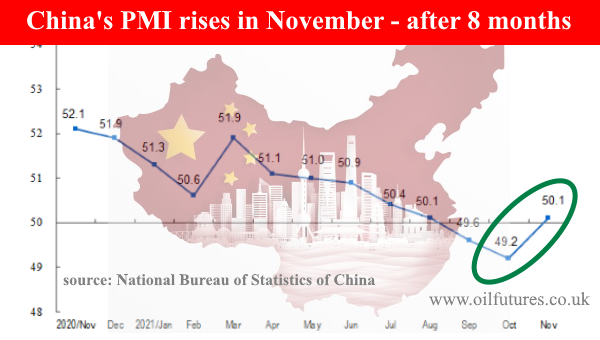China’s Manufacturing Purchasing Managers Index, PMI, has
risen by 0.9 in November, buckling the downward trend of the past 9 months,
according to the latest data released by the National Bureau of Statistics of
China.
The encouraging news from the world’s second largest
economy will be a significant booster for the markets in general and crude oil
markets in particular, given the widely-predicted gloom in the first quarter of
2022.
China, along with the other major consuming nations,
resorted to tapping into strategic petroleum reserves, SPRs, in order to curb
the rising energy costs. China had been doing it even before joint move in a
controlled manner.
Although the impact on the crude oil price was next
to insignificance despite the collective move, the resurgence of the
Coronavirus did what the former could not do; it brought down the price of
crude oil by over $10 in a matter of hours since the gravity of the new wave of
the pandemic became clearer.
Although the OPEC+ stuck to their original plan by
promising to increase the output by 400,000 bpd, it made clear that there would
be an oil glut in the first quarter of 2022, vowing to take measures to safeguard
its interests accordingly.
In this context, the announcement by China about the
rise in its Manufacturing PMI, having been in the doldrums for over nine
months, could potentially be the much-needed silver line in the gloomy crude
oil clouds.
China suffered a critical energy crisis in September
and October as there was not enough coal to power up electricity generators,
leaving many regions without power. The cumulative impact had been felt by its industrial
heartlands too, which in turn exacerbated the economic growth.
Having come down hard on speculators and hoarders, China
finally managed to address the coal crisis, which in turn eased the pressure on
the global energy markets too, especially at the outset of cold, winter months.
The fall of gas price, perhaps, may, in part, be due
to the successful handling of the energy crisis by the communist nation – with the
iron-fisted approach, of course.
If the price of oil crude oil remains at the current
level, without going through the roof, China will resort to importing it in
proportion to the growth of its economy.
This will in turn boost the coffers of oil producing
nations too in the short term, as their long-term fortunes are at the mercy of
the progress made in the global renewable sector, something way beyond their
control.
The right price for crude oil is important for both
producers and consumers – for mutual survival; rising energy prices have triggered heightend the inflationary pressure almost in every nation, inclduding those of the OPEC+.
In the UK, for instances, the Office of National Statistics, has given the follwing updatef ro October:
If oil producers suffer, as it happened at the
beginning of the pandemic, the impact will be felt far beyond the geographical boundaries
of the producers, especially in the Middle East; the health of these economies
determines the livelihoods of millions of less-fortunate people in Africa and
Asia – directly.
Although the new variant of Covid-19, Omicron, is
worrying, the major oil consuming nations such as the US, Japan and India are
showing encouraging growth prospects. It may dampen the gloom predicted over
the crude oil markets slowly – defying the worst.








